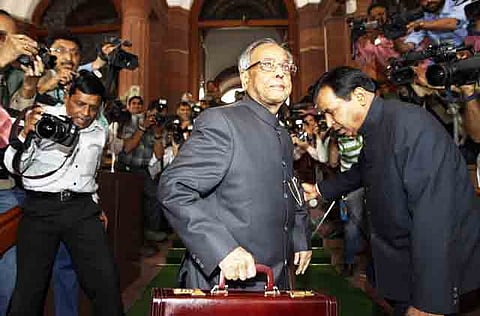Indian federal budget fails to impress the majority
Disappointing economists and stock market, India’s finance minister presents budget

Dubai: Disappointing economists, business leaders and stock market, India’s finance minister Pranab Mukherjee on Friday presented the federal budget 2012-13, which made a feeble attempt, at best, in reducing India’s ballooning fiscal deficit.
The budget set a fiscal deficit target of 5.1 per cent of GDP for the fiscal year, down from an expected 5.9 per cent in the current year. This year's figure, however, ended up far above the 4.6 per cent it had originally targeted in its budget a year ago.
Mukherjee said he expected the Indian economy to grow by 7.6 per cent in the next fiscal year, up from an expected 6.9 per cent in the current year but below the 8.4 per cent growth of the previous fiscal year.
"We are disappointed with the budget because it assumes a relatively high, 5.1 per cent deficit in the 2012-13 fiscal year. We also think that growth target is a bit too optimistic while inflation may have hard time falling as much as they are assuming,” said Dariusz Kowalczyk, senior economist and strategist at Credit Agricole, Hong Kong.
The 30-stock Bombay Stock Exchange index Sensex closed 244.61 points down at 17451.24.
High subsidies
Analysts said the budget did not make a serious effort to rein in subsidies. The Finance Minister announced that from 2012-13 while subsidies related to food and for administering the Food Security Act will be fully provided for, all other subsidies would be funded to the extent that they can be borne by the economy without any adverse implications. He said that the government will endeavour to restrict the expenditure on central subsidies under 2 per cent of GDP in 2012-13and over the next three years, it would be further brought down to 1.75 per cent of GDP.
“The market was hoping for a lower deficit for the next financial year, so disappointing from that perspective. India continues to have the largest fiscal deficit within emerging Asia, hence expect this to weigh on the rupee,” said Jonathan Cavenagh, foreign exchange strategist, Westpack, Singapore.
In the budget estimates for 2012-13, the gross tax receipts are estimated at 10, 7.76 trillion which is an increase of 15.6 per cent over the Budget Estimates and 19.5 per cent over the revised estimates for 2011-12. After devolution to States, the net tax to the central government in 2012-13 is estimated at Rs 77 trillion. The Non Tax Revenue Receipts are estimated at Rs16.46 trillion and Non-debt Capital Receipts at Rs 4.16 trillion. The total expenditure for 2012-13 is budgeted at Rs149 trillion. Of this Rs52 trillion is the Plan Expenditure while Rs96.9 trillion is budgeted as Non Plan Expenditure.
Tax proposals
The tax proposals are guided by the need to move towards the Direct Tax Code (DTC) in the case of direct taxes and Goods & Services Tax (GST) in the case of indirect taxes. For now it appears that the DTC has been deferred from the planned implementation from April 1, 2012.
Individual income upto Rs200,000 will be free from income tax; income upto Rs 180,000 was exempt in 2011-12. Income above Rs500,000 and upto Rs 1 million now carries tax at the rate of 20 per cent; the 20 per cent tax slab was from Rs500,000 to Rs800,000 in 2011-12. A deduction of up to Rs10,000 is now available for interest from savings bank accounts.
The budget made an attempt to widen the service tax base. All services will now attract service tax, except those in the negative list. The negative list has 17 heads and includes specified services provided by the government or local authorities, and services in the fields of education, renting of residential dwellings, entertainment and amusement, public transportation, agriculture and animal husbandry. Service tax rate is being increased from 10 per cent to 12 per cent, with consequential change in rates for services that have individual tax rates. The standard rate of excise duty for non-petroleum goods is also being raised from 10 per cent to 12 per cent. No change is proposed in peak rate of customs duty of 10 per cent on non-agricultural goods.
The direct tax proposals in the budget will result in a net revenue loss of Rs 450 billion and the raising of indirect taxes will result in a net revenue gain of Rs 4.6 trillion resulting in a net gain of Rs 4.1 trillion.
"The finance minister is looking to collect large sums of money through indirect taxes, probably to mitigate the fiscal situation, but this could have an impact on consumption,” said Deven Choksey, managing director of K R Choksey shares & Securities, Mumbai.



